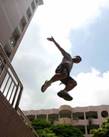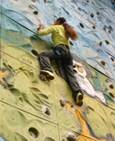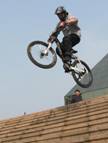-
第二部分 阅读理解(共20小题;每小题2.5分,满分50分)
阅读下列短文,从每题所给的A、B、C、D四个选项中,选出最佳选项。
Sydney Airport International Terminal-Arrivals Area
SPECIALTY RETAIL
Newslink: Two separate Newslink stores cater to all your reading needs including newspapers, magazines and the latest bestsellers.
Downtown Duty Free: Make sure you shop at Downtown Duty Free for great savings on a range of items including perfume, alcohol, skincare and cigarettes. It's your last chance before customs
Beach Culture: A must for those into the Latest in beach clothing. Top surf, street and fashion labels including Mambo, Stussy and Quicksilver, including children's sizes.
DINING
Blue Sky Cafe: Speedy service leaves you time to keep an eye on the arrivals gate. Morning pastries, fresh juice, breakfast rolls and coffee while you wait.
McDonald’s: hamburgers, fries, drinks, muffins and shakes—all your family favorites. Breakfast served until 10: 30.
SERVICES
ATM: ATMs are conveniently located throughout Arrival and Departures. Dollars, pounds, francs and RMB are all available.
Vodafone Rentals: This communications center offers the very latest technology for mobile phone rentals, sales and servicing.
1. Where is this passage likely to appear?
A. A morning newspaper. B. A monthly magazine.
C. A geography book. D. An official guide.
2. The underlined phrase “cater to” probably means _______.
A. satisfy B. afford C. support D. help
3. If you want to have some coffee while waiting for your flight, you can go to ________.
A. Vodafone Rentals
B. Blue Sky Cafe
C. Downtown Duty Free
D. McDonald' s
4. At Beach Culture you can buy ________.
A. newspapers and magazines B. skincare and cigarettes
C. Mambo and Stussy D. fresh juice and breakfast rolls
5. Which of the following is true according to the text?
A. You can have breakfast at McDonald's at 11:00 a. m.
B. You’ll save money if you buy alcohol or perfume at Downtown Duty Free.
C. You’ll not find any beach clothing for your seven-year-old boy in Beach Culture.
D. ATM service offers enough to enjoy yourself.
难度: 简单查看答案及解析
-
People turn to magic chiefly as a form of insurance—that is, they use it along with actions that actually bring results. For example, hunters may use a hunting charm (咒语). But they also use their hunting skills and knowledge of animals. The charm may give hunters the extra confidence they need to hunt even more successfully than they would without it. If they shoot a lot of game (猎物), they credit the charm for their success. Many events happen naturally without magic. Crops grow without it, and sick people get well without it.But if people use magic to bring a good harvest or to cure a patient, they may believe the magic was responsible.
People also tend to forget magic’s failures and to be impressed by its surface successes. They may consider magic successful if it appears to work only 10 percent of the time. Even when magic fails, people often explain the failure without doubting the power of the magic. They may say that the magician made a mistake in reciting the spell or that another magician cast a more powerful spell against the magician.
Many anthropologists (人类学家) believe that people have faith in magic because they feel a need to believe in it. People may turn to magic to reduce their fear and uncertainty if they feel they have no control over the outcome of a situation. For example, farmers use knowledge and skill when they plant their fields. But they know that weather, insects, or diseases might ruin the crops. So farmers in some societies may also plant a charm or perform a magic rite (仪式) to ensure a good harvest.
1. From the passage, we can learn that the writer of the passage may be _______.
A. a hunter B. a farmer
C. a magician D. an anthropologist
2. Which of the following can best serve as the title of the passage?
A. Magic And Hunting.
B. Magic And Farming.
C. Why Magic Works?
D. Why People Believe in Magic?
3. The underlined word “spell” (Paragraph 2) most likely means ______.
A. magic words B. magic events
C. words or expressions D. magicians
4. People believe in magic because________.
A. magic powers are greater than natural powers
B. magic can turn dreams into reality
C. they are not sure of themselves
D. magic can bring good results
5. Which of the following statements is NOT true according to the passage?
A. Even though magic fails, believers in magic will explain the reason.
B. Believers in magic usually overstate the power of magic.
C. People use magic to reduce their uncertainty and give them extra confidence.
D. Magic can solve problems people can’t deal with in a natural way.
难度: 简单查看答案及解析
-
Indians are the world’s biggest bookworms, reading on average 10.7 hours a week, twice as long as Americans, according to a new survey.
The NOP World Culture Score Index surveyed 30,000 people in 30 countries from December 2004 to February 2005.
Analysts said self-help and desirable reading could explain India’s high figures.
Time spent on reading meant fewer hours watching TV and listening to the radio—India came fourth last in both.
The NOP survey of 30,000 consumers aged over 13 saw China and the Philippines take second and third place respectively in average hours a week spent reading books, newspapers and magazines.
Britons and Americans scored about half the Indians’ hours and Japanese and Koreans were even lower—at 4.1 and 3.1 hours respectively.
R. Sriram, chief executive officer of Crosswords Bookstores, a chain of 26 bookshops around India, says Indians are extremely entrepreneurial (有开创精神的) and reading “is a fundamental part of their being”.
“They place a great deal of emphasis on reading. That’s the reason why they do well in education at home and in universities abroad,” he said.
“People educate themselves and deal with change throughout their lives. And the way to do that is to update themselves with books.”
Mr. Sriram says social changes have also made a difference: “Earlier people could turn to their parents and grandparents for advice.Now they turn to books.”
1. According to the time spent on reading, which of the following answers is right?
A. Indians>Americans>Chinese>Koreans
B. Americans>Chinese>Philippines>Japanese
C. Chinese>Indians>Americans>Philippines
D. Indians>Chinese>Philippines>Americans
2. The sentence “India came fourth last in both.” in paragraph four means_____.
A. Indians have no time to watch TV and listen to the radio
B. Indians are busy with their work every day
C. Indians spent more time on reading so that they have fewer hours watching TV and listening to the radio
D. People in other countries spent more time watching TV and listening to the radio
3. The time that Chinese spent on reading may be______ a week.
A. 5.35 hours B. less than 10.7 hours but more than 5.35 hours
C. more than 10.7 hours D. 10.7 hours
4. The Indians do well in education and universities abroad because_____.
A. they have excellent teachers in every school
B. they have qualities that are needed to succeed
C. they put much emphasis on reading
D. they live in a developed country
5. Which of the following is not mentioned in this passage?
A. Indians live a very rich life in their homeland.
B. Indians are those who spend much time on reading or studying.
C. Indians are those who spend fewer hours watching TV and listening to the radio.
D. Now the Indians turn to books for advice.
难度: 简单查看答案及解析
-
Parkour is a sport with the aim of moving from one point to another as smoothly, efficiently and quickly as possible using chiefly the abilities of the human body. It’s more similar to martial arts (武术) than to a sport. Parkour focuses on how any obstacle is dealt with, whether the obstacle is either physical or mental.
Inspiration for parkour came from the “Natural Method of Physical Culture” developed by Georges Hebert in the early twentieth century. French soldiers in Vietnam were inspired by Heber’s work and created what is now known as parcours du combatant (障碍训练课程). David Belle, who was introduced to this method by his father Raymond Belle, a Vietnamese soldier who had practiced it, had taken part in activities such as martial arts and gymnastics, and sought to apply his athletic skill in a manner that would have practical use in life.
After moving to Lisses, David Belle continued his journey with others. “From then on we developed,” says Sebastien Foucan, who helped to spread parkour, “and really the whole town was there for us; there for parkour.”
Over the years as devoted practitioners (实践者) improved their skills, their moves continued to grow in scale, so that building-to-building jumps and drops of over a storey(楼层) became common in media description, causing much misunderstanding on the nature of parkour.”
Although many practitioners say parkour isn’t an extreme sport, it does carry risk with it. The practice of running, jumping, and leaping from a variety of urban structures (roof tops, staircases, raised surfaces, walls, etc.) and landing on concrete, of course, carries the potential for injury. Some of the most common injuries include sprained (扭伤的) ankles and injuries to the knees.
According to one practitioner, “One of the biggest differences between parkour and other so-called ‘extreme’ sports is that it is not concerned only with physical skills, but also with one’s mental and spiritual pleasure.”
1. The second paragraph is mainly about _______.
A. Belle’s devotion to parkour B. the origin of parkour
C. the use of parkour during wartime D. the practical use of parkour in life
2. What do we know about David Belle?
A. He used to be a French soldier in Vietnam.
B. His attitude toward Hebert’s work was negative.
C. He and Foucan held different views on parkour.
D. He attempted to make full use of his athletic skill in life.
3. What do we infer from the passage?
A. The practitioners think parkour is worth the risk.
B. Parkour needs specially designed training places.
C. The practitioners are often blamed by the media.
D. Parkour was developed in the early twentieth century.
4. Parkour requires _______.
A. only the abilities of human body
B. move from one point to another
C. the ability to deal with mental problems
D. the ability to remove obstacles physically and mentally
5. According to the passage, which of the following is parkour?
A.
 B.
B. 
C.
 D.
D. 
难度: 简单查看答案及解析